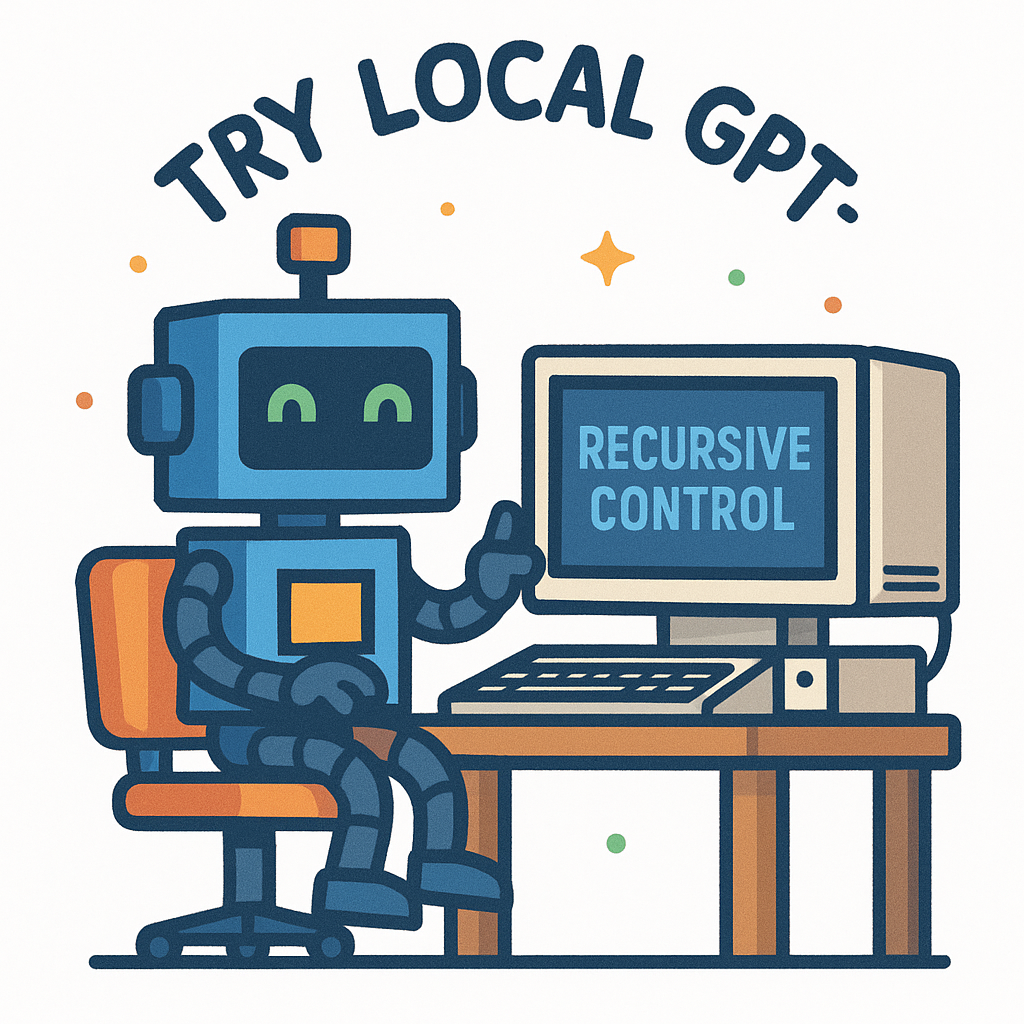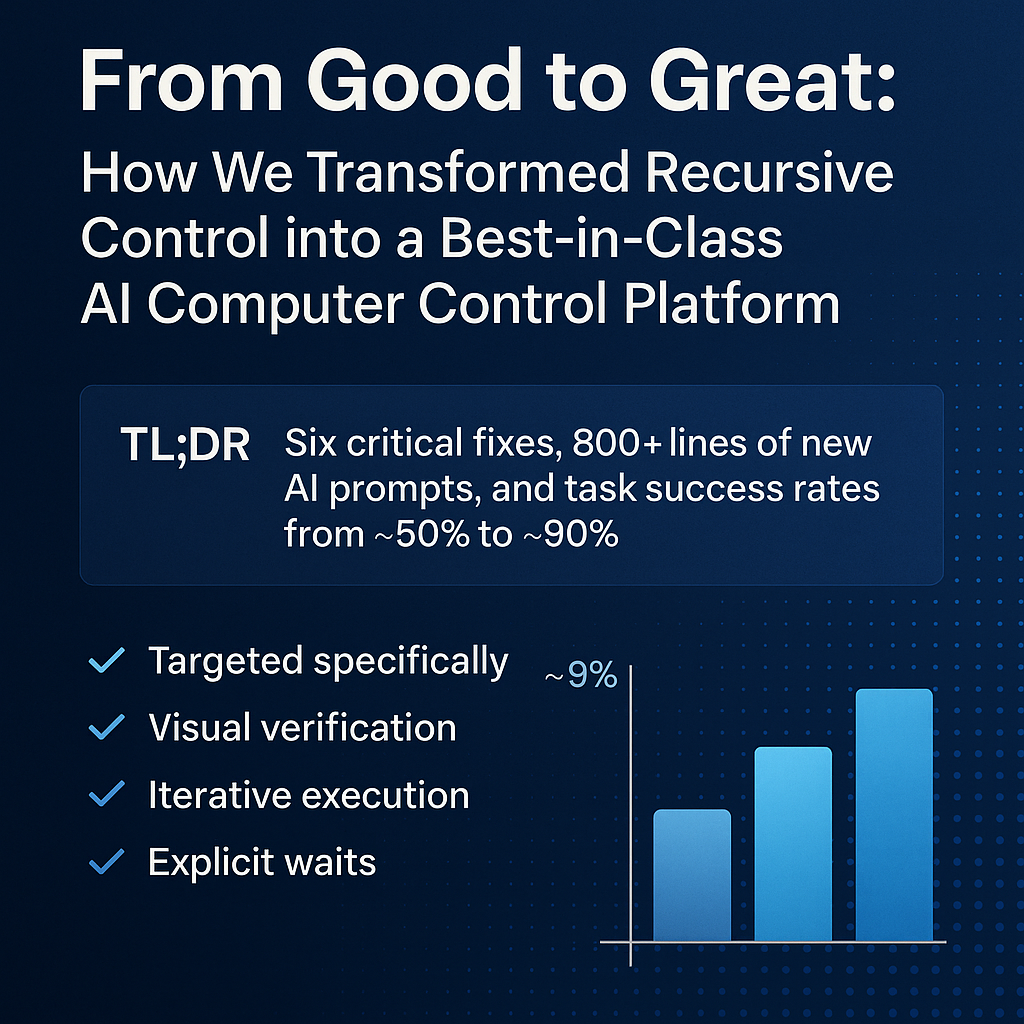Recursive Control: Now Runs GPT-oss Locally via LM Studio

We’re excited to announce a major upgrade to Recursive Control: full integration with LM Studio, now powering local execution of our GPT-oss model for recursive, agentic AI workflows.
👉 Explore the project on GitHub: flowdevs-io/Recursive-Control
What Is Recursive Control?
Recursive Control is an open-source framework designed to autonomously control your Windows computer using AI. The system can interpret natural language instructions, orchestrate workflows, and manage plugins that automate tasks like:
- Mouse and keyboard actions
- Command line operations
- Browser interactions
- File and system management
It’s powered by a multi-agent architecture (coordinator, planner, executor) and is fully extensible via plugins. Until now, most of its AI reasoning relied on cloud-based LLMs.
What’s New: Local GPT-oss via LM Studio
With LM Studio integration, Recursive Control can now run GPT-oss entirely on your machine.
Here’s what this unlocks:
- Fully local AI — no external API calls or cloud dependencies
- Privacy by default — your data never leaves your computer
- No usage costs — GPT-oss is open source and free
- Offline capability — works in disconnected environments
- Seamless integration — Recursive Control automatically uses your local LM Studio server when enabled
🛠️ How to Get Started
- Clone the repo:
git clone https://github.com/flowdevs-io/Recursive-Control.git- Install LM Studio.
- Download and load GPT-oss in LM Studio.
- Start the LM Studio server (default endpoint:
http://localhost:1234/v1). - In Recursive Control’s settings, enable LM Studio and point it to your local endpoint.
- Run Recursive Control and issue natural language commands — GPT-oss will handle the reasoning locally.
Why This Matters
Running GPT-oss locally with Recursive Control means you get the benefits of powerful AI without the trade-offs of cloud dependency:
- Privacy and security — nothing leaves your machine
- No costs — no API usage fees
- Faster responses — skip network latency
- Offline support — works even without internet
- Recursive orchestration — optimized for agentic control loops
🐛 Tips and Troubleshooting
- If responses are slow, reduce max tokens or use a quantized GPT-oss build.
- Check that LM Studio is running and accessible on
http://localhost:1234/v1. - Enable GPU acceleration in LM Studio for faster performance.
- Monitor system resources — larger models require more RAM and VRAM.
🚀 What’s Next
This update is just the beginning. With GPT-oss + LM Studio, Recursive Control is becoming:
- More private — all processing is local
- More affordable — no per-token costs
- More resilient — runs anywhere, even offline
Next steps include adding support for additional open models, improving automatic fallback between local and cloud AI, and optimizing performance for recursive agent loops.
👉 Try it today by downloading LM Studio, setting up GPT-oss, and running Recursive Control locally: flowdevs-io/Recursive-Control
We’re excited to announce a major upgrade to Recursive Control: full integration with LM Studio, now powering local execution of our GPT-oss model for recursive, agentic AI workflows.
👉 Explore the project on GitHub: flowdevs-io/Recursive-Control
What Is Recursive Control?
Recursive Control is an open-source framework designed to autonomously control your Windows computer using AI. The system can interpret natural language instructions, orchestrate workflows, and manage plugins that automate tasks like:
- Mouse and keyboard actions
- Command line operations
- Browser interactions
- File and system management
It’s powered by a multi-agent architecture (coordinator, planner, executor) and is fully extensible via plugins. Until now, most of its AI reasoning relied on cloud-based LLMs.
What’s New: Local GPT-oss via LM Studio
With LM Studio integration, Recursive Control can now run GPT-oss entirely on your machine.
Here’s what this unlocks:
- Fully local AI — no external API calls or cloud dependencies
- Privacy by default — your data never leaves your computer
- No usage costs — GPT-oss is open source and free
- Offline capability — works in disconnected environments
- Seamless integration — Recursive Control automatically uses your local LM Studio server when enabled
🛠️ How to Get Started
- Clone the repo:
git clone https://github.com/flowdevs-io/Recursive-Control.git- Install LM Studio.
- Download and load GPT-oss in LM Studio.
- Start the LM Studio server (default endpoint:
http://localhost:1234/v1). - In Recursive Control’s settings, enable LM Studio and point it to your local endpoint.
- Run Recursive Control and issue natural language commands — GPT-oss will handle the reasoning locally.
Why This Matters
Running GPT-oss locally with Recursive Control means you get the benefits of powerful AI without the trade-offs of cloud dependency:
- Privacy and security — nothing leaves your machine
- No costs — no API usage fees
- Faster responses — skip network latency
- Offline support — works even without internet
- Recursive orchestration — optimized for agentic control loops
🐛 Tips and Troubleshooting
- If responses are slow, reduce max tokens or use a quantized GPT-oss build.
- Check that LM Studio is running and accessible on
http://localhost:1234/v1. - Enable GPU acceleration in LM Studio for faster performance.
- Monitor system resources — larger models require more RAM and VRAM.
🚀 What’s Next
This update is just the beginning. With GPT-oss + LM Studio, Recursive Control is becoming:
- More private — all processing is local
- More affordable — no per-token costs
- More resilient — runs anywhere, even offline
Next steps include adding support for additional open models, improving automatic fallback between local and cloud AI, and optimizing performance for recursive agent loops.
👉 Try it today by downloading LM Studio, setting up GPT-oss, and running Recursive Control locally: flowdevs-io/Recursive-Control
Related Blog Posts

Journey to Vibe Coding on Your Local Computer: Codex Visual Studio Code Extension

The Flow of Vibe Coding on Lovable


.jpg)